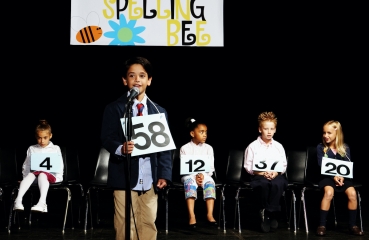What we're reading this week: July 22, 2021
The Education GadflyProf. Samuel Goldman’s column presented two options for conservatives who want to defeat critical race theory. But here’s a better way to advance their vision for academia.
How not to write state standards for civics and U.S. history
Jeremy SmithAs discussed in Fordham’s new report, many states aren’t making the grade when it comes to their civics and U.S. history standards, which are often vague to the point of being meaningless.
Schools face a double whammy this fall: illiteracy and illiberalism
Dale ChuWe’re not even midway through the summer and the start of the new academic year is in some cases just weeks away.
Preparing students of all races to achieve greatness
Ian RoweWhen looking for models of ambitious inspiration, Americans often hearken back to President John F. Kennedy’s “moonshot” address at Rice University on September 12, 1962:
Scaling up the Florida Tax Credit Scholarship program helped public schools improve
Jeff MurrayAs supporters of school choice celebrate a remarkable season of legislative wins across the country, they can also add some research-based evidence to their grounds for satisfaction.
What we're reading this week: July 15, 2021
The Education GadflyA mother shares her insights: “What I’ve learned about raising children who are young, gifted and Black.” —Washington Post We need strong leadership, like that provided by Ohio Governor DeWine and Baltimore Superintendent Sonja Santileses, to help district and school leaders focus on reopening a
Three hypotheses to explain this year’s big wins on school choice
Michael J. PetrilliDespite much anti-choice talk in national politics and some Congressional pushback, 2021 has seen an impressive string of victories for school choice at the state level, which is where it matters most. Was it the pandemic? Has the salience of the anti-school choice argument weakened over the past year? Or does Donald Trump deserve a lot of the credit? Read more.
Strong standards are vital for making history and civics central in K–12 education
Peter GibbonGone are the days when we could all agree with Ben Franklin’s sunny admonition: “Indeed the general tendency of reading good history must be, to fix in the minds of youth deep impressions of the beauty and usefulness of virtue of all kinds.” Instead, we must cope with political polarization, schools preoccupied with the achievement gap, students who learn from social media, and adults who are t
An improved forecast for the NAEP reading assessment
Chester E. Finn, Jr.The prolonged fracas within and far beyond the National Assessment Governing Board (NAGB) concerning a new “framework” for NAEP’s future assessment of reading has been ominous on several fronts—as I haven’t hesi
No, school choice is not the answer to critical race theory
Robert PondiscioWhy fight over critical race theory when we can choose? You teach oppression studies; I’ll teach American exceptionalism. It’s a simple and obvious solution. But it’s also a naïve and unsatisfying one. School choice may “solve” the CRT problem for an individual family, but it can’t address the clear interest that every American holds in the education of the next generation.
We have spelling bees. Why aren’t there reading bees?
Adam Tyner, Ph.D.Today, the Scripps National Spelling Bee finals
Texting parents helps improve student literacy. But how much is too much?
Jeremy SmithText-message nudges have been a viable tool in early-childhood literacy in recent years, with parents or guardians receiving occasional missives to encourage specific literacy activities with their children.
Are Virginia’s elementary schools worsening achievement gaps?
William RostA new working paper from researchers out of the University of Virginia uses data from the state’s kindergarten literacy assessment, the Phonological Awareness Literacy Screening (PALS), to examine how the subsequent achievement trajectories of kindergarteners who enter school with similar literacy levels differ by race and/or SES. The findings are worrying.
What we're reading this week: July 8, 2021
The Education GadflyEducation policy is a leading issue for Boston’s mayoral race, especially policies for exam schools and the method for selecting school board members.
The Education Gadfly Show #777: O-H-I-O: School reform victories in the Buckeye State
What parents and teachers think about critical race theory
Angela Sailor , Adam KisselA new Heritage Foundation survey of more than 2,000 parents and teachers shows significant divides about teaching critical race theory. But there largely is consensus that civics content should focus on the duties of citizenship, not CRT.
5 things I’ve learned from teaching U.S. history to high schoolers
José A. GregoryI’ve taught U.S. history to high schoolers for almost twenty years, during which time I’ve worked in multiple states with students of varying personal and cultural backgrounds. Below are the five things that I think I’ve learned. 1) Our students need more exposure to U.S. history.
We need better civics education, but it won’t happen anytime soon
Dale ChuFordham’s new report found that twenty states have “inadequate” civics and U.S. history standards that need a complete overhaul. An additional fifteen states were deemed to have “mediocre” standards that require substantial revisions. This fits the lackluster showing of U.S. students on the NAEP exams in these subjects, and suggests that some schools barely teach this content at all. Unfortunately, the obstacles in the way of improving this sad state run up and down the line.
How to strengthen U.S. history and civics standards
Louise DubéFor our constitutional democracy to survive, much rests on our ability to resolve “…differences even as we respect them,” which is The State of State Standards for Civics and History in 2021 report’s definition of the social purpose of civic education.
Dan Willingham’s "Why Don’t Students Like School" stands the test of time. That was the point.
Robert PondiscioMy 2009 copy of Why Don’t Students Like School by Dan Willingham is among the most dog-eared and annotated books I own. Along with E.D. Hirsch’s The Knowledge Deficit (2006) and Doug Lemov’s Teach Like a Champion (2010), I’m hard-pressed to think of another book in the last twenty years that had a greater impact on my teaching, thinking, or writing about education.
How gender gaps in math and literacy change as students age
Amber M. Northern, Ph.D.While women have largely erased, and in some areas even reversed, the historic gender gap in educational attainment, some career outcomes can still skew along gender lines.
What we're reading this week: July 1, 2021
Falling birth rates are forcing the closure of schools that served communities for generations, such as in Manchester, New Hampshire.
The Education Gadfly Show #776: Can curriculum reform succeed where the rest of standards-based reform failed?
Proof that it’s possible to approach civics and U.S. history in a balanced way
David Griffith, Chester E. Finn, Jr.Is America a racist country? Or the greatest nation on earth? Or both or neither or some of each?
Teaching U.S. history and civics in America’s pluralistic society
John Wood, Jr.The Thomas B. Fordham Institute’s review of state standards for U.S. history and civics comes at a critical moment in American civic life.





























